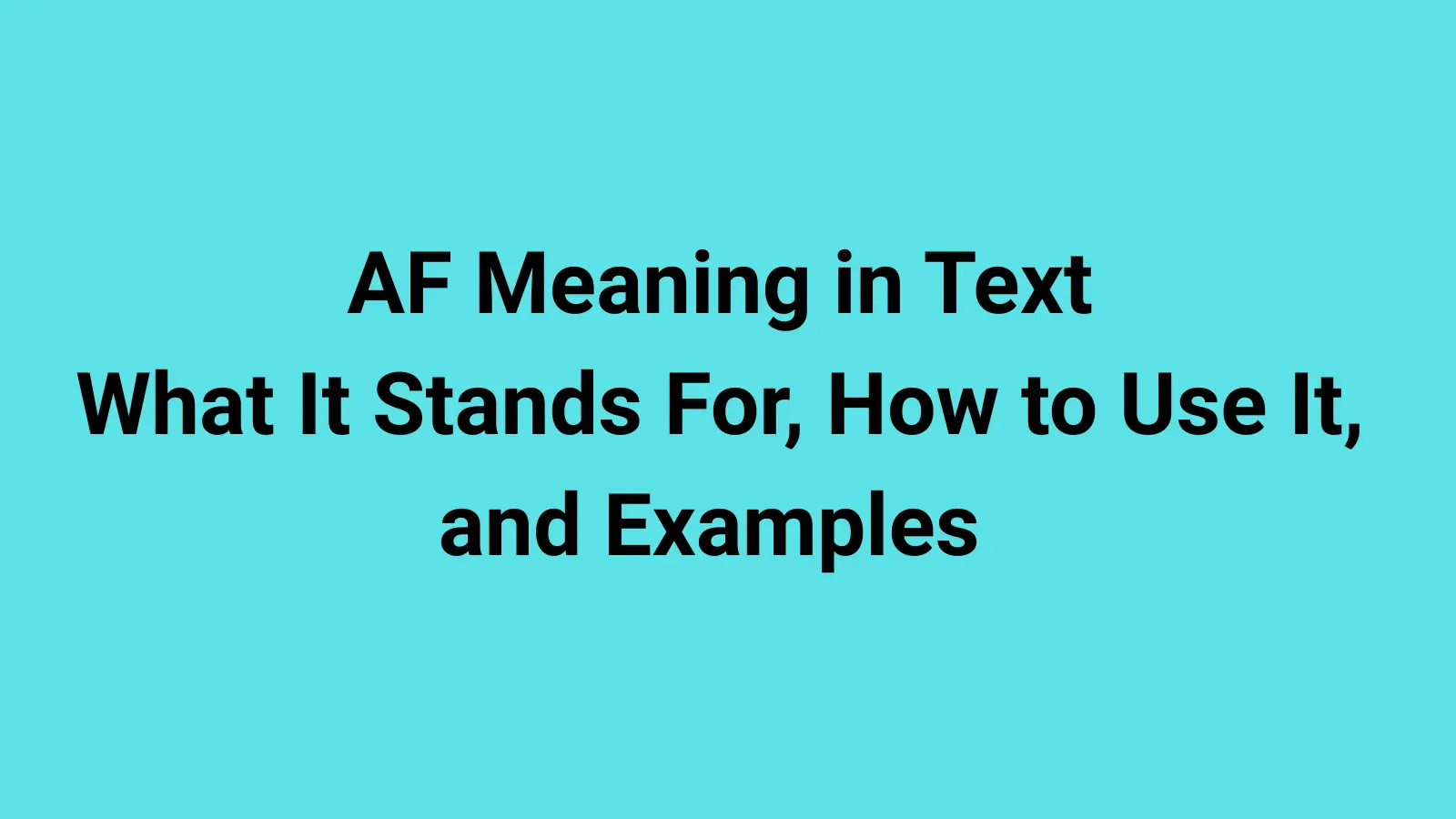If you’ve ever read a message that ended with AF and found yourself puzzled, you’re not alone.
AF meaning in text can seem cryptic at first, but once you know it, you’ll realize it’s one of the most expressive shorthand terms in modern messaging.
In texting, online chats, and social media captions, AF packs big emotions into two little letters.
This guide will explain every common and less common meaning of AF, where it comes from, how to use it naturally (or avoid misusing it), and how tone, context, and audience change its interpretation.
Whether you’re a teen on Snapchat, a casual Instagram poster, or a professional reading Slack threads, this is your one-stop breakdown.
AF Meaning in Text: The Short Answer
AF is an abbreviation for “as f*”** (an expletive), used informally to mean “extremely” or “very”. It intensifies whatever comes before it:
- “I’m tired AF” → “I’m extremely tired.”
- “That was funny AF” → “That was very funny.”
It’s considered slang, often NSFW (not safe for work), and is best kept to casual, peer-level conversations—not formal emails or professional settings. In safe-for-work contexts, some people use AF as a stand-in for “as freak,” “as flip,” or simply as a funny exaggeration without intending the profanity.
Why AF Became Popular in Texting
AF took off because:
- Short & punchy: Two letters, maximum impact.
- Fits the online vibe: Informal, meme-friendly, works in caps or lowercase.
- Expressive multiplier: Adds intensity to an adjective without adding extra words.
- Viral adoption: Spread through Twitter, memes, TikTok captions, and texting.
The phrase “as f**”* has been around for decades, but AF as an abbreviation gained momentum around the mid-2010s, becoming part of internet-native slang dictionaries and everyday casual texting.
AF Meaning in Text for Teens
In teen slang, AF is almost always:
- An intensity booster: “hungry AF,” “happy AF,” “cold AF”.
- Paired with emojis for extra vibe: “tired AF 😴”, “lit AF 🔥”.
- Used in lowercase (“af”) or uppercase (“AF”)—uppercase feels louder or more dramatic.
Examples in teen texting:
- “that movie was scary af”
- “math test was hard AF”
- “ur fit is cute AF 😍”
Tone note: Among peers, AF is casual. But it’s still rooted in profanity—most avoid using it with parents, teachers, or formal contacts.
AF Meaning in Text for Professionals
In professional or mixed-age settings:
- AF is rarely appropriate in its original form due to the explicit meaning.
- If used at all, it might appear in memes, internal team jokes, or informal Slack channels where everyone’s comfortable with slang.
- Safe substitutes: “super,” “really,” “mega,” “insanely.”
Example (informal team Slack):
- “Our traffic numbers are up AF 🚀” — might work in a relaxed startup chat.
Example (safe rewrite):
- “Our traffic numbers are way up 🚀” — same excitement, work-appropriate.
AF Meaning in Text for Casual Users
Outside of work, AF thrives in:
- Group chats
- Social captions
- Tweets or Instagram stories
- Dating app bios (“funny AF,” “single AF”)
Casual users may:
- Use AF ironically: “productive AF” when they’ve done almost nothing.
- Use AF with positive or negative adjectives alike: “blessed AF,” “broke AF.”
Variations and Safe-for-Work Replacements
Not everyone wants the profanity implied in AF. Popular clean swaps include:
- As Freak (funny as freak)
- As Flip (tired as flip)
- As Fun (cool as fun)
- As Fabulous (stylish as fabulous)
Some even use AF but claim it means something else entirely in a given chat—making it a kind of inside joke.
How AF Is Used in Different Text Contexts
1. Emphasizing emotions:
- “Happy AF right now.”
- “I’m bored AF.”
2. Hyping compliments:
- “You look good AF in that outfit.”
- “That dessert was delicious AF.”
3. Venting frustrations:
- “Traffic is annoying AF today.”
- “This weather is cold AF.”
4. Ironic humor:
- “Healthy AF” while eating pizza.
- “On time AF” when showing up late.
The Role of Tone and Formatting in AF Usage
Lowercase (“af”):
- Feels casual, soft, understated: “cute af”.
Uppercase (“AF”):
- Feels louder, more emphatic: “TIRED AF”.
With emojis:
- Guides tone: “nervous af 😬”, “lit af 🔥”, “sleepy af 😴”.
Without emojis:
- Can seem more blunt or serious.
Less Common Meanings of AF in Text
While “as f*”** is by far the dominant meaning, AF sometimes means other things in niche contexts:
- Auto Focus — in photography or camera settings.
- April Fools — in seasonal chat contexts.
- Air Force — in military texts.
- Affectionate Friend — rare, in wholesome or coded use.
- Away From — occasionally in gaming chats.
These are context-specific and much less common in casual social messaging.
How to Tell Which AF Meaning Is Intended
Ask yourself:
- Is this a casual, slang-filled message? → Likely “as f***.”
- Is the conversation about cameras? → Probably “auto focus.”
- Is it around April 1st? → “April Fools.”
- Is it in a military chat? → “Air Force.”
Context, audience, and platform are your main clues.
AF in Social Media Captions
On Instagram, TikTok, and Twitter (X), AF is:
- Common in bold, sassy captions: “Confident AF”, “Cozy AF.”
- Paired with aesthetic photos, selfies, or memes.
- Often hashtagged: #cuteAF, #funnyAF.
Example captions:
- Photo of beach sunset: “Chill AF 🌅”
- Selfie after workout: “Strong AF 💪”
- Pic of dessert: “Sweet AF 🍰”
Why AF Works So Well in Memes
AF fits meme culture because:
- It’s short → fits in image text overlays.
- It’s punchy → exaggerates the joke.
- It’s flexible → works with sarcasm, sincerity, or irony.
Example:
- Picture: Cat lying dramatically.
- Text: “Tired AF but still fabulous.”
AF and Generational Perception
- Gen Z & Millennials: Comfortable using AF in casual contexts.
- Gen X & Boomers: Some recognize the slang, others may misread or dislike it.
- Cross-generational chats: Spell out the full phrase or avoid to prevent awkwardness.
AF vs. Similar Slang
- Hella — West Coast slang for “very,” less explicit.
- Super — Neutral, safe for all contexts.
- Mad — Some regions use “mad” as “very” (e.g., “mad cool”).
- So — Simpler emphasis without slang baggage.
When Not to Use AF
- Formal work emails
- School assignments
- Messages to elders or unfamiliar contacts
- Public-facing professional posts
- Legal or customer communications
Polite Ways to Replace AF
Instead of “cold AF”, say:
- “Freezing”
- “Super cold”
- “Chilly as can be”
- “Extremely cold”
Instead of “happy AF”, say:
- “Thrilled”
- “Over the moon”
- “Super happy”
- “Excited beyond words”
Fun, Creative AF Examples (Clean and Spicy)
Clean version:
- “Productive AF” (as freak)
- “Early AF” (as flip)
- “Comfy AF” (as fun)
Spicy version:
- “Confident AF”
- “Hungry AF”
- “Broke AF”
How to Introduce AF to Someone New to Slang
- Use in a casual context first.
- Pair with an emoji to signal humor or friendliness.
- If they ask, explain it’s short for “as [expletive],” meaning “very” or “extremely.”
AF in Pop Culture
AF has appeared in:
- Memes since early 2010s.
- Song titles (Lit AF, Savage AF).
- Merch like mugs, T-shirts (“Tired AF,” “Cute AF”).
- Viral tweets and TikTok trends.
Risks of Using AF
- Misinterpretation by people unfamiliar with slang.
- Offense due to implied profanity.
- Unprofessional impression in the wrong setting.
Quick Self-Test Before Using AF
Ask:
- Do I know the recipient well?
- Is this channel casual enough?
- Am I okay with them knowing I’m comfortable with slang/profanity?
- Would this be fine if screenshotted and shared?
If in doubt, skip it.
Recap Table: AF Meanings in Text
| Meaning | Context | Example |
| As F*** (slang) | Casual, peer chats, memes | “Hungry AF” |
| Auto Focus | Photography, tech chats | “Turn AF mode on” |
| April Fools | Around April 1st | “You believed it? AF 😂” |
| Air Force | Military texts | “AF base in Texas” |
| Affectionate Friend | Wholesome code | “Thanks, AF” |
Conclusion: You’re Fluent in AF
AF meaning in text is simple once you know the main definition “as f***” for emphasis but it can take on different roles depending on context.
Use it freely in casual, slang-friendly spaces, but be mindful in professional or cross-generational settings.
And remember: the magic of AF isn’t just in its letters it’s in the tone, timing, and shared understanding between sender and receiver.











